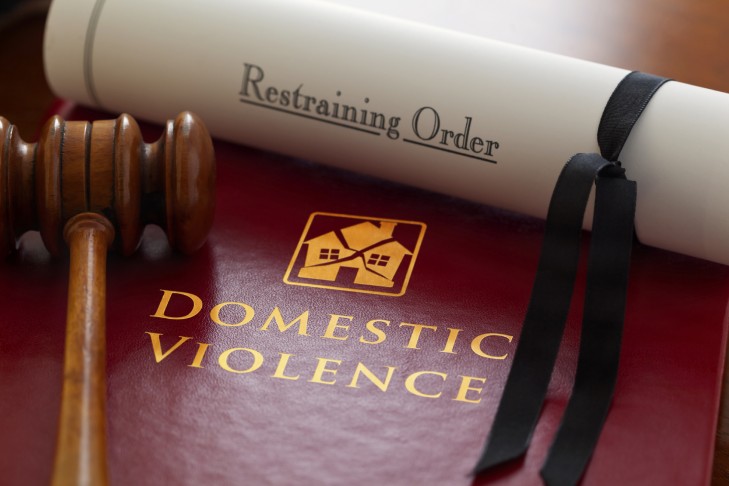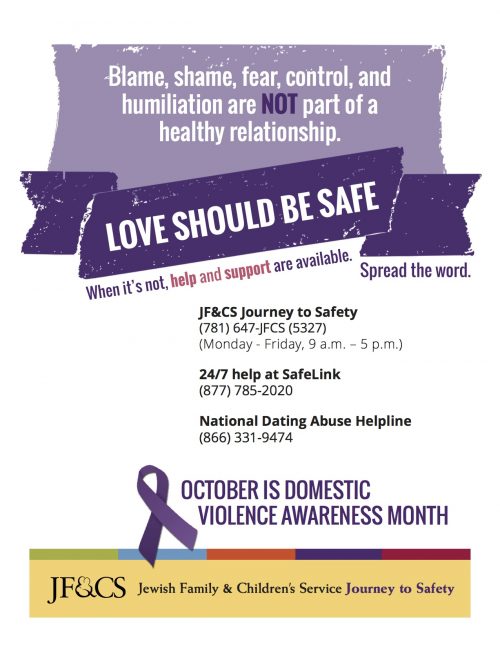There is a myth entrenched in the Jewish community that domestic abuse happens to other people. Elizabeth Schön Vainer, program director of Journey to Safety, the domestic abuse program at Jewish Family & Children’s Service (JF&CS), wants to debunk that myth once and for all. And the timing couldn’t be better. October is Domestic Violence Awareness Month, and Schön Vainer and her colleagues have launched a campaign proclaiming that, “Love Should Be Safe.”
Schön Vainer recently sat down with JewishBoston for a wide-ranging conversation about the services her program offers, as well as its critical and discreet role in the Jewish community. First and foremost, Schön Vainer points out, “Journey to Safety’s mission starts with preventing domestic abuse in the Jewish community while helping those who have been abused find their way to safety, regardless of their background. What makes us unique is that preventing domestic abuse in the Jewish community is our driving mission.”
Schön Vainer finds the term “domestic violence” limiting. “Domestic abuse,” she notes, is more encompassing. The term refers to a partner within an intimate relationship perpetrating or imposing a pattern of abusive behavior over another person that occurs over a period of time. Oftentimes, immigration issues will come into play in this dynamic. “We serve clients from all over,” says Schön Vainer, “and many times the immigration piece and the multicultural piece come into play. A lot of people are undocumented or here on a spousal visa and are not eligible for public benefits. There is no bank account, no credit cards or even a phone. Access to these resources is completely controlled by another person. Isolation is such a big part of what happens.”
In the course of a year, Journey to Safety fields over 200 calls and requests for services. Schön Vainer works with two full-time advocates, one of whom speaks Russian fluently, in following through on inquiries. Of those women who reach out, approximately 30 are Jewish, which she feels is a deceptively low number. “We know that [domestic abuse] is happening in the Jewish community and we know that [Jewish] victims and survivors are not reaching out for help. We wonder if Jewish women are concerned about being seen by someone they know. But we’re extremely confidential and meet people anywhere it’s comfortable and convenient for them.”
When people do reach out for help, whether by email or calling Journey to Safety, they will likely hear back on the same day. Once Schön Vainer and her staff are aware of a situation, they provide support, counseling, court accompaniment and can direct a client to appropriate resources that include legal assistance, as well as services embedded within JF&CS. For example, there is a new legal service for which Journey to Safety received federal funding to retain attorneys at reduced fees that is free to clients. The lawyers associated with the service provide emergency civil legal assistance in the form of restraining orders, custody disputes and child support. Schön Vainer notes that while her program cannot fund a full-service legal process, “We can help in a limited way with the kinds of legal needs that become important to someone around being safe. We’re filling in a gap.”
It’s not surprising that when we met, Schön Vainer mentioned that she was reading Leigh Stein’s new memoir, “Land of Enchantment.” The book chronicles Stein’s own journey to safety from an abusive relationship. Stein opened up about her story in a recent conversation. She noted that she met her ex-boyfriend at a particular time in her life when she craved excitement and drama. Stein was 22 and her abuser was 19. The two were instantly drawn to each other, and a few months later they moved from Chicago to Albuquerque. Without access to a car or a support network in New Mexico, Stein was essentially isolated. “There was also a certain romance to my isolation—that we only needed each other,” she said. “But once I was isolated, the abuse often escalated.”
Like Schön Vainer, Stein emphasized that many Jewish communities don’t address domestic violence as something that can happen to them. “No matter what ethnicity, one in four women will experience psychological, physical or sexual abuse in her lifetime,” she said.
To that point, there is a teen component within Journey to Safety called TeenSafe. TeenSafe trains young people to be knowledgeable around issues of dating abuse and sexual assault. Last year TeenSafe piloted a new program for high-school seniors and their parents informing them about how to be safe and healthy in college with a focus on sexual-assault prevention. “One of our goals,” says Schön Vainer, “was to lay the foundation for conversations around sexual assault and to help parents and students know that we have resources and that every campus also has resources.”
Both Schön Vainer and Stein acknowledge that the label of domestic abuse victim can also be shameful. “No one wants to think of herself as victim. And sometimes people see that label only after they’ve left an abusive partner,” Schön Vainer says. Stein added: “Women don’t want to acknowledge that this is happening. They are entrapped by stereotypes of smart, assertive, Jewish women. I considered myself a very strong, independent woman. To have to admit I was powerless with this person was a shameful secret. But it can happen to anyone.”
This post has been contributed by a third party. The opinions, facts and any media content are presented solely by the author, and JewishBoston assumes no responsibility for them. Want to add your voice to the conversation? Publish your own post here. MORE




